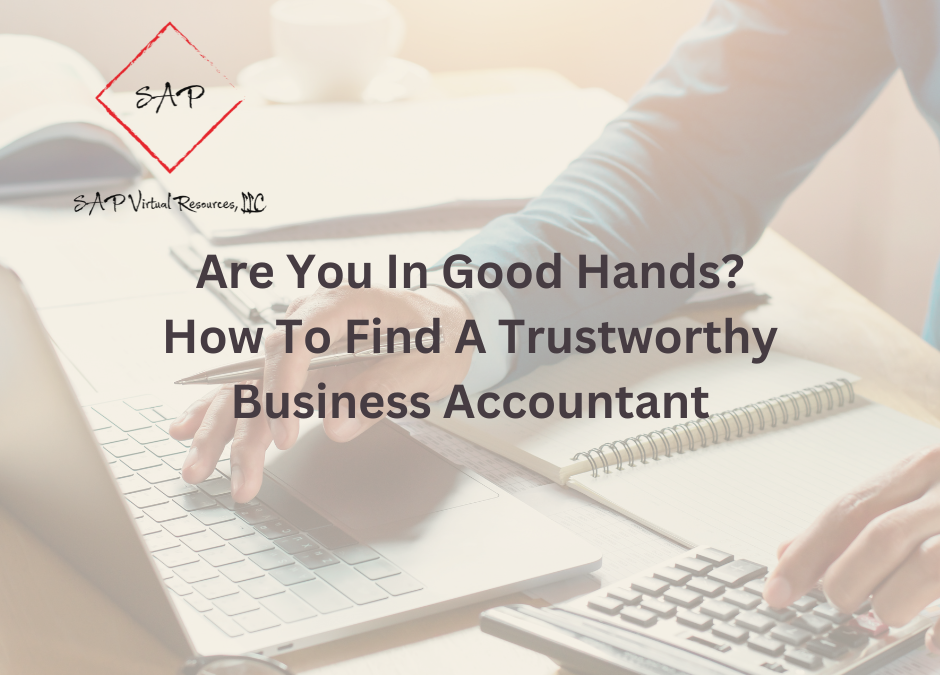One of the most critical hires you will make is your business accountant.
As a business owner, you have a lot on your plate. Between managing clients, handling operations, and staying ahead in your industry, your finances should be one area where you feel entirely confident.
That’s where your accountant comes in. But how do you know if you can genuinely trust them? A good small business accountant isn’t just someone who files your taxes. They should be a strategic partner in your business, helping you make informed decisions, stay compliant, and maximize profitability.
Trusting your accountant isn’t just about their credentials—it’s about transparency, communication, and shared values. Here’s how to know if your accountant is the right fit for you.
1. Credentials and Experience Matter—But So Does Compatibility
Your accountant must have the right qualifications, whether a CPA (Certified Public Accountant) or extensive bookkeeping experience. However, experience alone isn’t enough—they also need to understand your industry and business model.
- Do they have experience working with businesses of your size and type?
- Have they handled tax planning or financial strategy for similar industries?
- Are they familiar with your tools and systems, like QuickBooks or Xero?
But beyond their technical skills, do they understand you? A trusted advisor should understand your goals and align with your vision. Whenever you have a financial concern, you should feel comfortable talking about it with them.
2. Communication is Key—Are They Responsive and Clear?
You should never feel like your financials are a mystery. A trustworthy small business accountant takes the time to explain things in a way you understand without making you feel like you need a finance degree just to keep up.
Here is what to look for:
- They respond to emails or calls promptly – no waiting weeks for a simple answer.
- They break things down clearly without using jargon that leaves you more confused.
- They are proactive, reaching out before major financial deadlines and not scrambling at the last minute.
If you constantly chase your accountant for information or feel they don’t have time for your questions, it may be time to reassess the relationship.
3. Transparency and Ethics—Are They Open About Their Processes?
A good accountant should be upfront about how they work and what they charge. Fees shouldn’t be unexpected, hidden, or described in vague terms.
Ask yourself:
- Do they clearly explain their services and pricing?
- Are they transparent about handling taxes, bookkeeping, and financial planning?
- Do you understand your options, or do they tell you what to do without explanation?
🚩Red flag: If an accountant suggests something unethical or “creative” to lower your tax bill, run. No legitimate accountant will encourage shady financial practices.
4. Proactive vs. Reactive—Do They Help You Plan Ahead?
A great small business accountant isn’t just there to clean up messes at tax time—they help you plan to avoid those messes in the first place.
The right accountant will:
- Offer tax planning advice throughout the year, not just in April.
- Help you budget, manage cash flow, and make financial decisions confidently.
- Identify potential deductions and savings opportunities before it’s too late.
If your accountant only contacts you when it’s time to file taxes and never provides strategic advice, you’re missing valuable financial guidance.
5. Client Testimonials and Referrals—What Do Others Say?
What do other business owners say about working with your accountant? A strong reputation is one of the best indicators of trustworthiness.
Check online reviews, ask for client references, or simply talk to other entrepreneurs in your network.
Some questions to consider:
- Do they have positive feedback from long-term clients?
- Do their clients mention trust, reliability, and strong communication?
- If there are negative reviews, how did they handle them?
A credible accountant will have no problem providing references or case studies showcasing their work.
6. Trust Your Gut—Do You Feel Comfortable?
Trust isn’t just about credentials or experience—it’s about how you feel working with them. Your accountant should make you feel confident in your financial decisions, not anxious or uncertain.
If you ever feel like:
- You can’t ask questions without feeling embarrassed.
- You’re not sure exactly what your accountant does for you.
- You’re uneasy about their advice or communication style.
…it may be time to look for someone else. The right small business accountant will empower you with knowledge and support, making financial decisions more manageable, not harder.
Your Small Business Accountant Should Be Your Trusted Partner
Being a numbers person isn’t the only criterion that makes your accountant a trusted partner. They should take responsibility for providing transparency, strategic advice, and confidence in your bookkeeping. Review these key factors if you doubt your business accountant is the right fit.
Let’s talk if you’re looking for an accountant who prioritizes your business’s success and financial clarity! At SAP Virtual Services, we help business owners like you gain confidence in your numbers, plan ahead, and grow with a solid financial foundation.
Are you ready to work with someone you trust? Contact us today!

